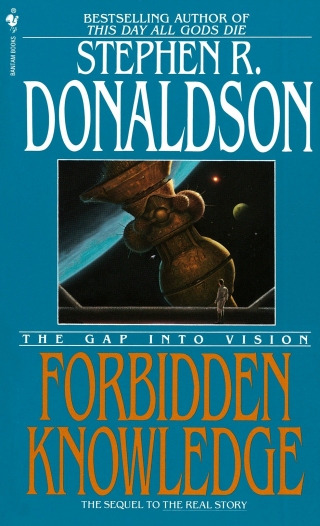
He growled a curse under his breath, then insisted harshly, “Delay doesn’t conform to your purpose or mine.”
“Time,” came the reply, “is not accessible to manipulation.”
As if out of nowhere, Vector Shaheed asked amiably, “Is that philosophy or physics?”
Whenever I mean to write something here, on this site, I hit some problems. The biggest one is that to write a thing I need at least two hours of undivided attention. But my attention is usually very divided, so things get postponed. After a few days I’ve already moved on to something completely different, and that means it gets increasingly unlikely that I get into the suitable mindset to write the thing I was supposed to. So things end up either unfinished, or not happening. Anyway…
This book brings me back. I started to read actual novels in English, not my native language, only after the summer of 2007. I also stopped reading fantasy and sci-fi many years before then. My return, and beginning with reading English novels, started with “The Real Story”, the first book in this “Gap” series by Donaldson. Reading the book in English for the first time was challenging but quite fun, and the choice of the book helped. It is short, almost novella-size, small scale, but also built like a puzzle that unravels page by page. Pulling aside the curtain of the language to understand its meaning was matched by the little pieces of plot that eventually come to compose “the real story”.
You won’t find a review of that book around here, because I only started writing right after it. Actually the fist book I began with, at the end of that summer, was The Eye of the World. But I read that in Italian, then moved to The Real Story, then The Great Hunt, which I did review, and then The Blade Itself… everything else followed. But by December I had the whole Gap series with me. I can look back and rebuild the timetable thanks to the blog, and CRINGE at what I was thinking and writing at the time… First, I have now a much better opinion of Donaldson’s fantasy side, and secondly, “kinky mindcontrol”… nope. There’s nothing “kinky” about it. And those few paragraph read like an apology of Angus Thermopyle, which is horrifying for me to read now.
What happened since then? The “reading progress” up here is stuck… to a few years ago. But I was using goodreads to track some progress (but this too would get ignored for a long time). I decided to reread The Real Story at some point during the first months of the pandemic. Then moved, during the summer of 2020, to Forbidden Knowledge, only to stop right halfway through. I restarted this January and since I didn’t remember all that much, I kept moving back chapters, to the point I’ve basically read the whole thing again from page 1. Curiously, the main reason why I got stuck, back in 2020, was that I was close to the end and I wanted to write something here, but I didn’t have the time. So I started reading other stuff, and again I drifted away. This time I finished the book, but once again I risked skipping writing about it, because already almost 10 days went by, and it isn’t easy to go back and retrieve my thoughts. I either write about things when they are fresh, or I don’t. But then I don’t have the time, and I delay… All this to explain why I usually don’t.
To write about Forbidden Knowledge I’d have to go back and reintroduce The Real Story, which is also unlikely because it’s been two years already. It’s hard for me to say I “enjoyed” the read, because things here are quite painful. These are stories about abuse. Heavy, painful abuse done by disagreeable characters, pushed to the extreme, and then pushed again further. The horror is not implied. The thing that Donaldson does best, especially in Forbidden Knowledge is giving you the first person perspective. The “I” that FEELS. There is no blinking, there are no eyes averted from the brutality. It goes deep, in the flesh, and the mind. The physical abuse is surpassed by the psychological, emotional pain, that ends up soaking everything. It’s not simple to “praise” this type of writing, but it is what it is. There are moments when the protagonist has a worry, in the back of her mind, that page by page worms its way up, until it becomes everything she sees, despite what happens all around her urgently demands her attention. This kind of obsessive whirlpool is the real engine of the story. It’s what pushes every character to do the impossible, whether it is to cause pain or desperate survival.
On the other hand, the plot is engaging. “The Real Story” has a feel so pulpy that it’s almost like reading Charles Bukowski in space. Even the technology is old-school, with a “retro” and gritty, grimy feel similar to Mad Max, but written so well that it makes sense. Computers and spaceships aren’t a noisy background, they are the pulpy meat of the plot. Rules kept simple, but well thought, so they they are pieces of information you can get familiar with. In the first book the story fits in your hand. A puzzle with many small parts that you assemble piece by piece, and the satisfaction of seeing it click. It’s space opera, but only engaging with three characters and a space station. It’s personal, it’s human, in all ways right and terribly wrong. “Forbidden Story” smoothly follows. It’s not anymore a puzzle with a solution, but a desperate attempt to an escape. So desperate that the only way is going deeper. Until the lack of an exit becomes the least worry. The abusers of the first book get their abuse served back to them, and then more. At some 2/3 though the book things start to get silly, to the point I honestly thought it was all going off the rails(*). But that’s where Donaldson has his skill. The story is rooted so well and deeply in the psychology of the characters that he makes the silly still make sense. The sense of urgency, of pain and even filth, don’t give enough space to disentangle emotionally. It works. Aliens step into the story, you get more infos about “the stage”, the story opens up. To a scale that isn’t anymore personal, but that is still 100% driven personally. I suppose things will continue to open and escalate in the following books.
But these two books are not made of two halves. The plot is entangled with the abuse. It’s a great sci-fi story, I think really well written, with vivid characters. It also means the abuse itself is vivid. It goes beyond a problem of “trigger warning”, but also why I end up praising it. That’s why I was wrong even joking about the “kinky mindcontrol”. There isn’t anything kinky or suggestive about it. There is no satisfaction in it, no matter how perverse. Donaldson describes it the way it is, with no qualms. It’s disgusting. What’s essentially a pulpy page-turner gets hard to read because the amount of ruthless, unrelenting abuse. This second book pushes it further, to levels that are absurd and unhinged. But here’s the point: this isn’t a story about villains. We generally end up praising villains that are well written, when they have plausible motivations. Here it’s one step beyond because the tables are turned, so many times. It’s not a case of a complex character that is well written. The abuse is so prominent that is is the theme. But it’s not about abuse, it’s about agency. And the questions being asked dig deeper than a villain with plausible motivations.
The first book was indeed about abuse. Ripping agency out of a victim, but the victim being smart and hard enough to be able to push back, with vengeance despite having no control and no hope. The abuser pushed so deep down his hole, leaving him howling in pain. In the second book I think roles don’t matter anymore. And the theme is pushed deeper. What is even agency when you can turn pain into pleasure by pressing a button. Donaldson, who wrote the deep emotional feel of a point of view on the page, breaks the rules. It opens the skull to play with the brain, to rewire it. But it is never the curiosity to make an experiment.
Characters still drive the plot. 100% of it. All the characters, even those on the side, have a reason to be where they are, and the pain they deliver to others is because they are also pushed to their limits. They try their best to survive, despite everything that happens around them pushes them to their limit. Then the limits are broken. Till the point Donaldson gives you a sense of annihilation. Where even survival is being doubted.
That’s why, for me, it’s such a great book. Every nuance and act of a character has a cause. Even when an abuser stops the abuse, it has a cause. The physical abuse is only superficial compared to the psychological and emotional. And it goes back and forward between abuser and abused that all roles vanish. Characters that are moved, by what they are and how they feel, so that they are trapped with themselves and in themselves. And you are in there, locked in there, with eyes wide open because there’s no other place to be. No escape, no elsewhere.
Dare you enter. Let the book tell its story.
(*)
Fun fact. The book I have has at its end an ad for the following volume… That in just a few lines of text contains a MASSIVE spoiler about something that happens in THIS book. Back in 2020 I read it, and so fell victim to that spoiler. When I picked back up the book early this month, a year and a half later, I completely forgot that part. So I un-spoiled myself.

